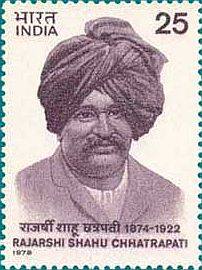
26 June 1874: Birth anniversary of Rajarshi Shahu Chatrapati Maharaj.
Shahu was born on 26 June 1874 as Yeshwantrao Ghatge, eldest son of Appasaheb Ghatge, chief of Kagal (senior) by his wife Radhabai, a daughter of the Raja of Mudhol [Maharashtra]. He was adopted by Anandibai, widow of Raja Shivaji IV, in March 1884. Several generations of inter-marriage had ensured that Shahu’s family was connected intimately with the ruling dynasty of Kolhapur, which is apparently what rendered him a suitable candidate for adoption, despite his not being a male-line member of the Bhonsle dynasty. A council of regency was appointed by the British government of India to oversee affairs of state during Shahu’s minority and during that time he was tutored in administrative affairs by Sir Stuart Fraser. Shahu was invested with ruling powers upon coming of age in 1894. There is one college named Rajaram college built by Shahu Maharaja.
Shahu Maharaj is credited with doing much to further the lot of the lower castes. He did much to make education and employment available to all: he not only subsidized education in his state, eventually providing free education to all, but also opened several hostels in Kolhapur thereby facilitating the education of the rural and low-castes. He also ensured suitable employment for students thus educated, thereby creating one of the earliest known Affirmative action programs in history of India. Many of these measures were effected in the year 1902.
Shahu’s other initiatives included restricting Child marriage in his state and the encouragement of intercaste marriage and widow remarriage. He long patronized the Satya Shodhak Samaj but later moved towards the Arya Samaj. Under the influence of these social-reform movements, Shahu arranged for several non-brahmin youths to be trained to function as priests, in defiance of timeless convention which reserved the priesthood for those of the brahmin caste. However, he faced opposition from many, including Lokamanya Bal Gangadhar Tilak, the very famous patriot of that time. There are many instances of Shahuji Maharaj and Dr. Ambedkar where they shared a common bond and is well evident in Mooknayak (weekly publication by Dr. Ambedkar).Shahuji Maharaj during his address in the depressed classes conference Kolhapur said described Dr. Ambedkar as the future national leader and shocked orthodox society by dining with Dr. Ambedkar. .
Chhatrapati Shahu was very fond of wrestling and encouraged it in his kingdom. Many wrestlers from all over India came to Kolhapur, as wrestling enjoyed royal patronage in Kolhapur.
The government of India hails Shahu as “A social revolutionary, a true democrat, a visionary, a patron of the theatre, music and sports and a prince of the masses. Chhatrapati Shahu was a many-splendoured personality who thought and acted far ahead of his times.”
Full name and titles
Shahuji’s official name was: Colonel His Highness Kshatriya-Kulawatasana Sinhasanadhishwar, Shrimant Rajarshi Sir Shahu Chhatrapati Maharaj Sahib Bahadur, GCSI, GCIE, GCVO
During his life he acquired the following titles and honorific names:
§ 1874-1884: Meherban Shrimant Yeshwantrao Sarjerao Ghatge
§ 1884-1895: His Highness Kshatriya-Kulawatasana Sinhasanadhishwar, Shrimant Rajarshi Shahu Chhatrapati Maharaj Sahib Bahadur, Raja of Kolhapur
§ 1895-1900: His Highness Kshatriya-Kulawatasana Sinhasanadhishwar, Shrimant Rajarshi Sir Shahu Chhatrapati Maharaj Sahib Bahadur, Raja of Kolhapur, GCSI
§ 1900-1903: His Highness Kshatriya-Kulawatasana Sinhasanadhishwar, Shrimant Rajarshi Sir Shahu Chhatrapati Maharaj Sahib Bahadur, Maharaja of Kolhapur, GCSI
§ 1903-1911: His Highness Kshatriya-Kulawatasana Sinhasanadhishwar, Shrimant Rajarshi Sir Shahu Chhatrapati Maharaj Sahib Bahadur, Maharaja of Kolhapur, GCSI, GCVO
§ 1911-1915: His Highness Kshatriya-Kulawatasana Sinhasanadhishwar, Shrimant Rajarshi Sir Shahu Chhatrapati Maharaj Sahib Bahadur, Maharaja of Kolhapur, GCSI, GCIE, GCVO
§ 1915-1922: Colonel His Highness Kshatriya-Kulawatasana Sinhasanadhishwar, Shrimant Rajarshi Sir Shahu Chhatrapati Maharaj Sahib Bahadur, Maharaja of Kolhapur, GCSI, GCIE, GCVO
§ Knight Grand Commander of the Order of the Star of India (GCSI)-1895
§ King Edward VII Coronation Medal-1902
§ Knight Grand Cross of the Royal Victorian Order (GCVO)-1903
§ Hon. LLD (Cantabrigian)-1903
§ Delhi Durbar Gold Medal-1903
§ King George V Coronation Medal-1911
§ Knight Grand Commander of the Order of the Indian Empire (GCIE)-1911
§ Delhi Durbar Gold Medal-1911
Legacy
Once the late Pandit Jawaharlal Nehru said, “Dams are not just constructions of cement and concrete, but in fact are places of pilgrimage in the modern India.” This was not the first vision towards this development as Kolhapur’s King Shahu Maharaj realized it almost 100 years before and decided to construct Radhanagari Dam, which is considered the second dam in India (next to Kallanai by Karikala Chola), on 18 February 1907. The place of the dam was decided and construction of houses for labourers and officials was started which took almost two years, so the foundation stone for the dam was laid down in 1909. In those days, there were neither engineering experts nor the availability of a skilled labor force; hence work progressed at a very slow rate. There is a story about the shortage of funds also in air but King Shahu Maharaj was determined to complete the project so that the water for irrigation would be available in abundance so it would add to the per capita income of Kolhapurkars.
Radhanagari Dam was completed in 1935 and since 1938 has been working at full capacity. Normally it is said that Indian kings and rulers overlooked the problems of common citizens but Radhanagari Dam is the living illustration of Shahu Maharaj’s vision towards the development and welfare of common citizens.




Gr 8 work